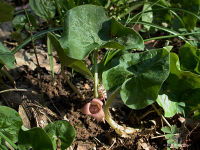Zingiber officinale
| See Also | Botanical Monographs |
|---|
Ginger (Zingiber officinale) is well-known for its effectiveness in treating nausea and vomiting, but it is also effective as a digestive aid and in the treatment of inflammatory conditions. To explore the characteristics, medicinal uses and prescribing considerations of this herb in more detail, check out the references indicated. [1], [2]
Contents
Characteristics
- Common Names: Ginger
- Family: Zingiberaceae
- Habitat: Zingiber officinale is native to Asia and is widespread in the tropics.
- Parts Used: Root/rhizome
- Constituents: Oleoresins (pungent principle; gingerols and shogaol)
- Medicinal Actions: warming stimulant tonic, aromatic, anti-inflammatory, antiemetic, carminative, digestive stimulant, cholagogue, cardiotonic, antithrombotic (high doses), rubefacient, respiratory stimulant, diuretic, spasmolytic, antiseptic, emmenagogue, pungent, sialagogue, sedative, diaphoretic, analgesic, antimalarial, antimicrobial, cardiac tonic
Uses
Historical Uses:
Zingiber has historically been used for dyspepsia, vomiting, cholera, and malaria. It is thought to have been derived from the Garden of Eden.
Medicinal Uses:
Prescribing Considerations
The information provided is intended to augment the treatment from a naturopathic doctor or other trained medical professional. Although most herbs are generally safe, it is recommended that you avoid self-prescribing especially when there is an underlying ongoing medical condition, if you are on any prescription medications or if you are pregnant or breastfeeding.
Formulations and Preparation
- Infusion - 1 tsp/cup as needed
- Dried rhizome - 0.25-1.0g taken orally as a capsule, tablet, powder, or decoction three times daily
- Tincture - 1.5-5mL (1:5, 40%) three times daily or 1.5-3mL (1:5, 90%) three times daily
- Powder - 1-2g as a single dose antiemetic (For motions sickness, take 2-4g daily)
Safety
The safety and prescribing considerations for this herb include:[3], [4]
- Generally regarded as safe.
- Side-effects are rare but may include heartburn and digestive upset.
- Cautions and Contraindications: pregnancy due to its emmenagogue/abortifacient action (empirical) in a dose of >2g daily, doses greater than 1g daily should be used only when the patient is under medical supervision; gallstones without physician consult due to its cholagogue action (speculative)
- Drug-Herb Interactions.[3]
- Anesthesia, General - Beneficial or supportive interaction with professional management, prevention or reduction of drug adverse effect; Zingiber reduces post-operative nausea and vomiting (PONV) caused by anesthetics. Possible alternative to pharmaceuticals in moderate PONV. Insufficient activity for emetic rescue in acute cases. Consider pretreatment in elective surgery patients.
- Antiplatelet Agents - Potential or theoretical adverse interaction of uncertain severity; This is based on Zingiber's "NSAID-like" activity (clinical occurrence and significance not established, increase risk of bleed negligible). Professional monitoring advised but preferably avoid.
- Cisplatin and Emetogenic Antineoplastic Chemotherapies - Beneficial or supportive interaction with professional management, prevention or reduction of drug adverse effect; Zingiber reduces acute nausea and vomiting associated with these drugs. Consider pretreatment and post-treatment (up to 24 hours) for nausea.
- Nonsteroidal Anti-inflammatory Drugs (NSAIDs) and Analgesic Antiarthritics - Beneficial or supportive interaction not requiring professional management, prevention or reduction of drug adverse effects; Zingiber given as an adjuvant helps to increase symptom relief and reduces side effects of drug allowing for lower doses.
- Phenprocoumon and Related Oral Vitamin K Antagonist Anticoagulants - Potential or theoretical adverse interaction of uncertain severity; Zingiber has a theoretical additive effect on hemostasis (one case report, conflict with clinical data, suggests risk generally overstated). Monitor INR.
References
- ↑ Boon Heather, Smith Michael (2009) 55 Most Common Medicinal Herbs: The Complete Natural Medicine Guide Second Edition Institute of Naturopathic Education and Research, CCNM Toronto.
- ↑ Godfrey Anthony, Saunders Paul, Barlow Kerry, Gowan Matt (2011) Principles and Practices of Naturopathic Botanical Medicine, Advanced Botanical Medicine. V3 CCNM Press, Toronto.
- ↑ 3.0 3.1 Stargrove Mitchell Bebell, Treasure Jonathan, McKee Dwight L (2008) Herb, Nutrient and Drug Interactions: Clinical Implications and Therapeutic Strategies.
- ↑ Brinker Francis (1997) Herbal Contraindications and Drug Interactions: Plus Herbal Adjuncts With Medicines, 4th Edition Eclectic Medical Publications.
